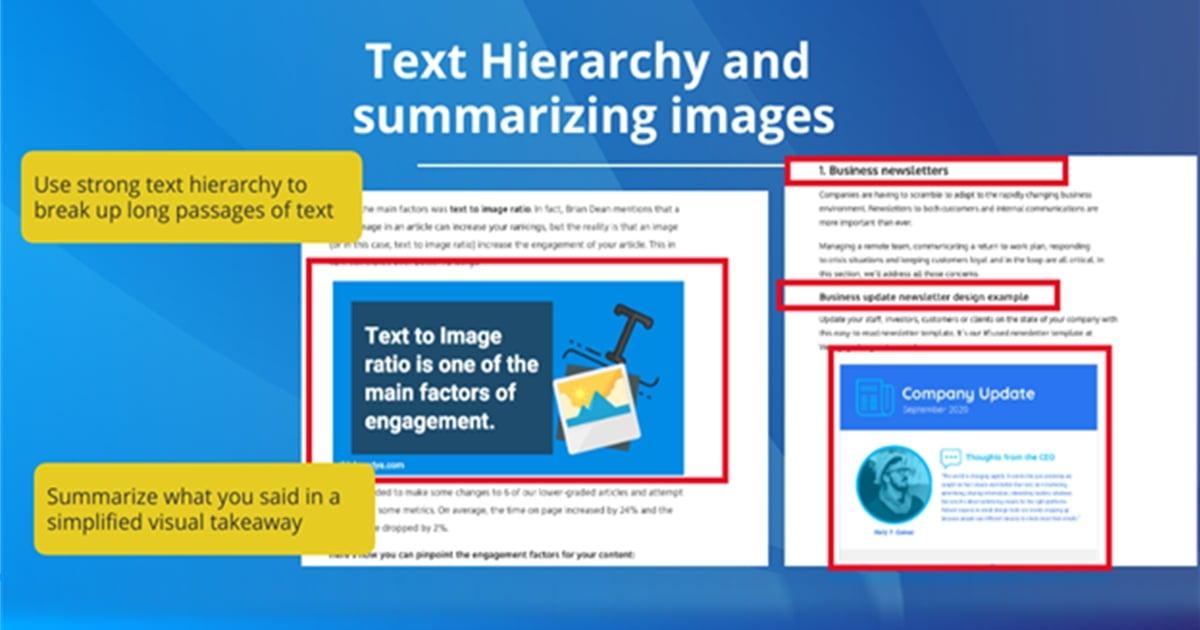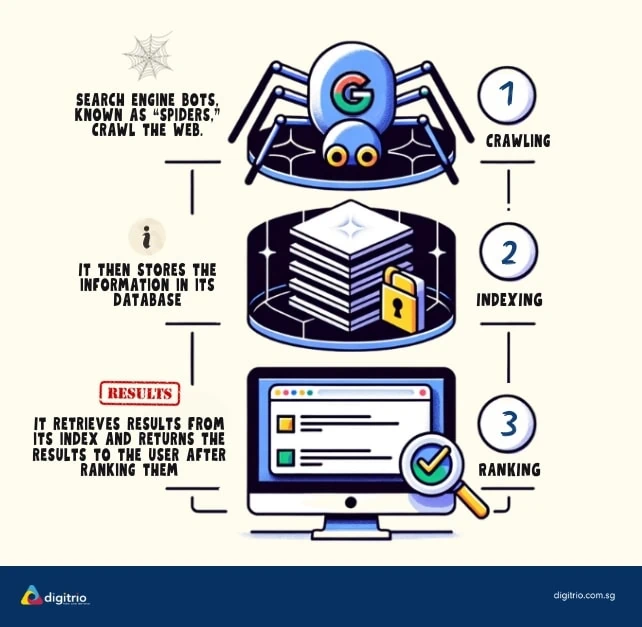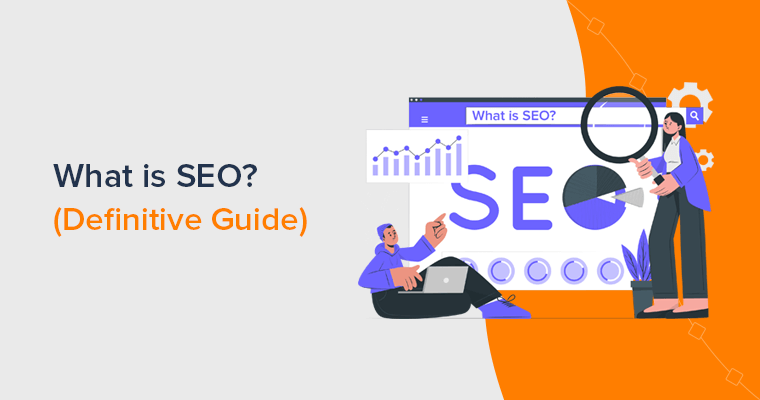Unlock the secrets of SEO with this simplified guide for beginners. Boost your website’s ranking with easy-to-follow tactics and tips.

Image courtesy of via DALL-E 3
Table of Contents
Introduction to SEO
SEO, or Search Engine Optimization, is like the secret code that helps websites become more popular and visible on search engines like Google, Bing, and Yahoo. It’s an essential tool that website owners use to make sure more people can find and visit their websites.
What is SEO?
SEO stands for Search Engine Optimization. Simply put, it helps websites show up better in searches on various search engines. When someone looks for something online, SEO helps the search engines understand which websites are the most relevant and useful to show.
Why SEO is Important
Imagine you have a cool website with lots of interesting things to read, but nobody knows about it. That’s where SEO comes in. With good SEO, more people can find your website. This means more readers who enjoy your content, more customers who buy your products, and ultimately, more success for you!
Basic SEO Concepts
Keywords are the words people use to look things up online. When you search for something on Google, Bing, or Yahoo, you type in keywords to find what you’re looking for. Websites use these keywords to match what people are searching for. By using the right words on your website, you can make it easy for people to find you. Choosing the right keywords is like picking the best words from a secret codebook that unlocks the treasure chest of your website!
Creating Good Content
Content is everything you put on your website. It includes text, images, videos, and more. Good content not only looks nice but also uses keywords smartly. Imagine you’re telling a story to your friends. You want to make sure it’s interesting and keeps their attention. When you create good content on your website, you’re making sure it’s not only fun to read but also easy for search engines to understand. It’s like serving a delicious cake with all the right ingredients!
The Importance of Relevance
Relevance is like being in tune with what people want. When you search for something online, you expect to find information that matches your search, right? That’s where relevance comes in. When your website’s content matches what people are searching for, search engines like it better. It’s like having a superpower that makes your website stand out among others. So, always make sure your content is relevant and up-to-date to keep those search engines happy!
On-Page SEO
On-page SEO involves the practices applied directly on your website’s pages to improve its visibility on search engines like Google, Bing, and Yahoo. By using the right tags, headings, and descriptions, you can make your site more attractive to both search engines and readers.

Image courtesy of www.leannewong.co via Google Images
Using Tags and Headings
Tags and headings play a crucial role in organizing your content and telling search engines what your page is about. Heading tags, like H1, H2, and H3, help search engines understand the structure of your content. Using descriptive tags and headings can also make it easier for readers to navigate your site and find the information they need.
Writing Meta Descriptions
Meta descriptions are short blurbs that provide a summary of your page’s content in search engine results. It’s like a mini-preview that tells people what your page is about. Writing compelling and relevant meta descriptions can entice users to click on your link and visit your site.
Using Images Wisely
Images can make your content more engaging and visually appealing. When adding images to your website, make sure to use descriptive filenames and alt text that incorporate relevant keywords. This way, search engines can better understand your images and index them appropriately, improving the overall SEO of your site.
Off-Page SEO
Backlinks are like votes from other websites. When other sites link to yours, it tells search engines that your website is valuable and trustworthy. Just like real votes, the more backlinks you have from reputable sources, the better your site will perform in search engine rankings.
Using Social Media
Social media is a powerful tool for improving your website’s SEO. By sharing your content on platforms like Facebook, Twitter, and Instagram, you can increase your site’s visibility and attract more visitors. The more people who share and engage with your posts, the more likely it is that search engines will view your site as authoritative and relevant.
Building Online Relationships
Connecting with other website owners and bloggers in your niche can be beneficial for your site’s SEO. By forming good relationships and collaborating on content, you can earn valuable backlinks from their sites. These backlinks act as endorsements and can significantly boost your website’s credibility and visibility in search results.
Technical SEO
A fast website makes visitors happy. When a website loads quickly, people can see the information they need faster. Search engines like Google also prefer sites that load quickly because they provide a better user experience. To improve your website speed, you can optimize images, use a reliable hosting provider, and minimize unnecessary plugins or scripts.

Image courtesy of www.marketingprofs.com via Google Images
Making Your Site Mobile-Friendly
Many people use their smartphones or tablets to browse the internet. It’s essential to ensure that your website looks good and works well on smaller screens. A mobile-friendly website adjusts its layout and content to fit various screen sizes, providing a better experience for mobile users. You can achieve this by using responsive design, which automatically adjusts your website’s appearance based on the device being used.
Understanding Sitemaps
A sitemap is like a map that helps search engines navigate and understand the structure of your website. It lists all the pages on your site, making it easier for search engine crawlers to discover and index your content. By providing a sitemap, you can ensure that search engines can find and display your web pages in search results more efficiently. You can create a sitemap using tools like Google XML Sitemaps or Yoast SEO plugin for WordPress.
Monitoring and Analytics
Google Analytics is a tool that helps website owners understand how visitors find and use their websites. It gives you important information about your site’s performance, such as how many people visit, where they come from, and what they do on your site. By using Google Analytics, you can track which pages are popular, how long visitors stay on your site, and where they might be leaving. This information can help you make informed decisions to improve your website’s performance and user experience.
Tracking Website Traffic
Tracking website traffic means keeping an eye on the number of visitors your site receives and where they are coming from. Knowing these details can provide valuable insights into the effectiveness of your SEO strategies and help you identify areas for improvement. By analyzing your traffic data, you can see which sources are driving the most visitors to your site, which keywords are performing well, and which pages are the most popular. This information can guide your content creation and optimization efforts to attract more visitors and keep them engaged.
Measuring Performance
Measuring your website’s performance involves evaluating the impact of your SEO efforts and determining what changes have led to improvements or setbacks. By monitoring key performance indicators (KPIs) such as traffic, bounce rates, conversion rates, and keyword rankings, you can assess the effectiveness of your SEO strategies and make data-driven decisions. If certain tactics are not yielding the desired results, you can adjust your approach and test different methods to see what works best for your website. Remember, SEO is an ongoing process, so regularly analyzing your website’s performance is crucial for long-term success.
Common SEO Mistakes to Avoid
One common mistake many beginners make is overusing keywords. While keywords are important for SEO, stuffing too many of them into your content can make it seem forced and unnatural. It’s essential to find a balance and make sure your content remains easy and pleasant to read for your audience.

Image courtesy of digitrio.com.sg via Google Images
Ignoring User Experience
Another mistake to avoid is neglecting user experience on your website. A user-friendly site not only keeps visitors happy but also encourages them to spend more time engaging with your content. Factors like fast loading times, easy navigation, and clear information can significantly impact how users interact with your site and improve your SEO performance.
Tricky Tactics
Lastly, it’s crucial to steer clear of any tricky tactics or attempts to deceive search engines. Trying to cheat the system with black hat techniques can harm your site’s reputation and credibility in the long run. Instead, focus on creating valuable, authentic content that genuinely serves your audience’s needs. By being honest and ethical in your SEO strategies, you can build a strong online presence and attract sustainable traffic to your website.
Advanced SEO Techniques
Many people now use voice assistants like Siri or Alexa to search for information. This means it’s essential to ensure that your website is optimized for voice search. When people use voice search, they tend to use more natural language and longer phrases. So, incorporating long-tail keywords and conversational phrases into your content can help your website rank better when someone searches via voice.
Focusing on Local SEO
Local SEO is critical for businesses that serve a specific geographic area. By focusing on local SEO, you can help people in your community find you more easily. One way to improve your local SEO is by registering your business on Google My Business. This will make it easier for local customers to find information about your business, such as your address, phone number, and hours of operation.
Using Schema Markup
Schema markup is a form of microdata that you can add to your website to help search engines better understand your content. By using schema markup, you can provide search engines with more detailed information about your website, such as product details, reviews, and event dates. This can help improve your website’s visibility in search results and make your listing more appealing to users.
Summarizing Key Points
SEO, or Search Engine Optimization, helps websites show up better in searches on Google, Bing, and Yahoo. With good SEO, more people can find your website, leading to more readers, customers, and success!

Image courtesy of www.sitesaga.com via Google Images
Basic SEO Concepts
Keywords are the words people use to look things up online, and using the right ones can make your site easy to find. Good content uses keywords smartly and is interesting to read. Relevance means your content matches what people are searching for, making search engines like it better.
On-Page SEO
Tags and headings organize content and tell search engines what it’s about, benefiting both search rankings and reader understanding. Meta descriptions are short blurbs that show up in search results, informing people about your page. Images should be named well to help search engines understand them, making your content more engaging.
Off-Page SEO
Backlinks are like votes from other websites, signaling to search engines that your site is good and trustworthy. Sharing content on social media can attract more visitors. Building online relationships can result in more backlinks, further boosting your site’s credibility.
Technical SEO
A fast website makes visitors happy and also helps search engines rank your site higher. Ensuring your site is mobile-friendly is crucial since many people browse on phones. Sitemaps act as a map for search engines, guiding them to all the pages on your site.
Monitoring and Analytics
Google Analytics shows how people find and use your website, providing valuable insights for optimization. Tracking website traffic allows you to understand visitor behavior and make improvements. Measuring performance helps in identifying what works and what doesn’t in your SEO efforts.
Common SEO Mistakes to Avoid
Avoid overusing keywords, as it can make your content less readable. Prioritize user experience to keep visitors engaged on your site. Lastly, always focus on creating honest, helpful content rather than resorting to tricky tactics to deceive search engines.
Advanced SEO Techniques
Optimizing for voice search ensures your content is easily discoverable through voice assistants like Siri. Focusing on local SEO can help people in your area find your business more effectively. Using schema markup can enhance how search engines understand your site, making your listing more appealing.
Frequently Asked Questions (FAQs)
What is the most important part of SEO?
Good content and keywords are key. They help search engines understand and show your site.
How long does it take to see results?
SEO takes time. You might see changes in a few months. Keep working at it!
Can I do SEO myself?
Yes! Learn the basics and start applying them. Many tools and guides can help you.







